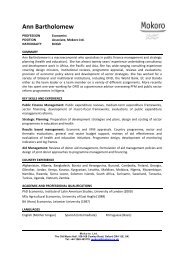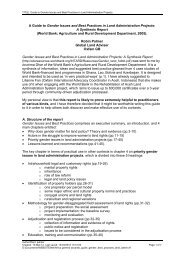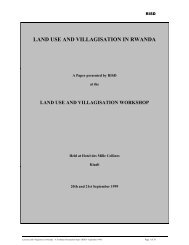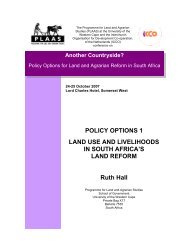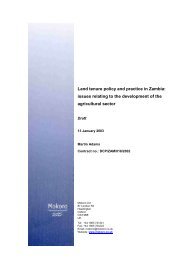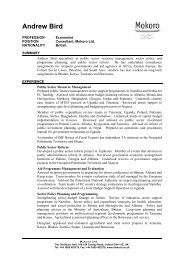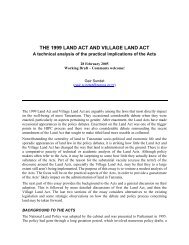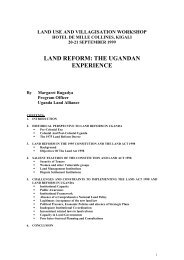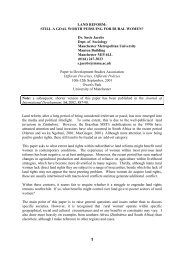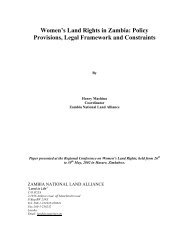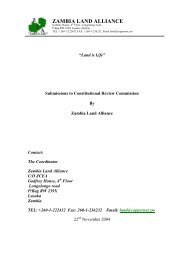Malawi National Land Policy - Mokoro
Malawi National Land Policy - Mokoro
Malawi National Land Policy - Mokoro
Create successful ePaper yourself
Turn your PDF publications into a flip-book with our unique Google optimized e-Paper software.
Ministry of <strong>Land</strong>s Page 12<br />
benefits from the land are to be distributed. Therefore, national land management should entail<br />
decision-making and the implementation of decisions about land.<br />
1.3.3 Secure <strong>Land</strong> Tenure: <strong>Malawi</strong>’s macroeconomic performance in 2000 shows the<br />
economy has remained quite unsatisfactory in the past five years. There was a 46% decline in<br />
the performance of the small-scale agricultural sector and an overall decline in real GDP<br />
growth from 3.6% in 1999 to 2.1% in 2000. Failure to reform and secure the tenure rights of<br />
smallholders has long been established as the primary cause of under investment, reliance on<br />
primitive technology and a fundamental reason for low wages in most rural areas. Because of<br />
the continuing deterioration of real incomes at the household level coupled with the heavy<br />
dependence of rural communities on the land, it is the Government’s imperative to place land<br />
policy at the center of the nation’s poverty reduction strategy.<br />
1.3.4. Sustainable <strong>Land</strong> Management: The correlation between ineffective land policy and<br />
poverty also negatively impair land resource management practices throughout the country.<br />
Because previous land policies neglected to reform the smallholder sector in particular the<br />
prevailing attitudes encouraged degradation and a rejection of traditional land resource<br />
management ethos in many rural communities. This national land policy presents a coherent<br />
socio-economic framework for promoting environmentally sustainable management of<br />
<strong>Malawi</strong>’s land resources for development.<br />
1.3.5 Productive and Efficient <strong>Land</strong> Use: The thrust to streamline land policy is to encourage<br />
citizens with the ability and resources to make productive and sustainable investments in land<br />
to have access and security of tenure. However, the desire to improve access also heightens the<br />
risk that, if legal security and other assurances of tenure are not provided, especially to<br />
customary landholders, land market uncertainty and population pressure may deprive some<br />
holders of the right to land. Therefore, the challenge for <strong>Malawi</strong> is to find the policy framework<br />
that will respond to market signals and people’s aspirations about how to use land within the<br />
regulatory environment set by the basic laws of the country.<br />
1.3.6 <strong>Land</strong> Administration: The administration of land is primarily concerned with<br />
controlling land use. <strong>Land</strong> use is a combination of human activities that occur on land and are<br />
specifically tied to parcels of land. Conserving virgin forest, subdividing land to accommodate<br />
housing development and zoning an area for commercial and industrial purposes are all forms<br />
of land use. Therefore the physical planning perspective provides a framework to reconcile<br />
social and economic objectives through the preparation of land use plans that optimize the<br />
distribution of private benefits without compromising the welfare of the nation as a whole.<br />
1.3.7 Vulnerable Groups From the institutional perspective, land policy is primarily<br />
concerned with social actions that influence and control people’s use of the land. More often<br />
than not, the rights of women, children and the disabled are denied on the basis of customs and<br />
traditions that are no longer relevant, or they are totally disregarded due to prejudice and lack<br />
of effective representation. This being so and in view of the effects of increasing land pressure<br />
due to population as well as the devastating effects of HIV/AIDS pandemic, a clear policy on<br />
gender access and the rights of children and the disabled should always be considered in policy<br />
planning and implementation strategies.<br />
1.3.8 Institutional Framework for <strong>Land</strong> Management: This national land policy includes not<br />
only the analysis of the constitutional context in which land is held and used in <strong>Malawi</strong>. It<br />
includes the legal framework by which issues relating to access and the content of land rights,<br />
control of land use by the state and traditional organs are determined. This policy provides a<br />
http://www.malawi.gov.mw/lands/landpol.htm 29/03/2005 15:23:13



